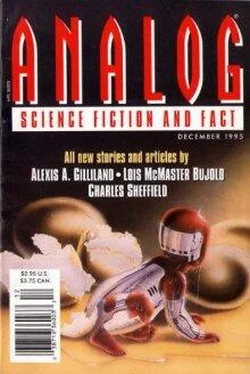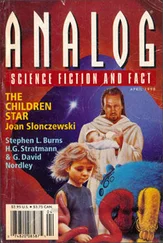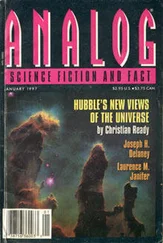Alexis Gilliland - The Third Wave
Здесь есть возможность читать онлайн «Alexis Gilliland - The Third Wave» весь текст электронной книги совершенно бесплатно (целиком полную версию без сокращений). В некоторых случаях можно слушать аудио, скачать через торрент в формате fb2 и присутствует краткое содержание. Год выпуска: 1995, Издательство: Dell Magazines, Жанр: Фантастика и фэнтези, на английском языке. Описание произведения, (предисловие) а так же отзывы посетителей доступны на портале библиотеки ЛибКат.
- Название:The Third Wave
- Автор:
- Издательство:Dell Magazines
- Жанр:
- Год:1995
- ISBN:нет данных
- Рейтинг книги:5 / 5. Голосов: 1
-
Избранное:Добавить в избранное
- Отзывы:
-
Ваша оценка:
- 100
- 1
- 2
- 3
- 4
- 5
The Third Wave: краткое содержание, описание и аннотация
Предлагаем к чтению аннотацию, описание, краткое содержание или предисловие (зависит от того, что написал сам автор книги «The Third Wave»). Если вы не нашли необходимую информацию о книге — напишите в комментариях, мы постараемся отыскать её.
The Third Wave — читать онлайн бесплатно полную книгу (весь текст) целиком
Ниже представлен текст книги, разбитый по страницам. Система сохранения места последней прочитанной страницы, позволяет с удобством читать онлайн бесплатно книгу «The Third Wave», без необходимости каждый раз заново искать на чём Вы остановились. Поставьте закладку, и сможете в любой момент перейти на страницу, на которой закончили чтение.
Интервал:
Закладка:
“The stars will belong to the Orthodox Vegans?” asked Morgan, deviating from his script. “Moving right along, when you get around to actually building a local space station out here, what will it look like?”
“Power panels,” said Winslow. “We’ll start off by doing a Diomedes Electric, analogous to Lunar Electric.”
“Unmanned, of course,” added Colonel Levsky.
“Of course,” agreed Winslow. “Potentially, the biosphere could soak up all the power we can produce. So rather than argue over the allocation of resources, we’ll create new resources, starting with power.”
“The public isn’t going to give a damn about unmanned solar power plants,” said Morgan. “That’s old stuff; Lunar Electric was designed thirty or forty years ago. What are we going to build for people? ”
Stepping from behind the camera the flamboyant Tosca looked up. “Winslow, trade places with me so I can take that one.” And when she was sitting behind the table she looked straight into the camera, radiating personality. “The power plant is designed for people. Everything we do here is designed for people. The station on the drawing board right now is a refined version of the tire and tube design that was put up at Lunar Three.”
“And just how was it refined?” asked Morgan, feeding her the question.
“The shielding in the ‘tire’ is going to be heavier, for one thing. For another,” Tosca hesitated, sorting through a mental list of changes. “Lunar Three has mirrors reflecting the sunlight through glass windows on the inside surface of the ‘tube,’ so that one deck of biosphere gets insolated.”
“That’s right,” said Morgan. “They tilt the mirrors to make day and night.”
“So that half the time we aren’t using the mirrors. The new station, call it Diomedes Three, will have an array of parabolic mirrors, like the ones that insolate the tunnels at Luna Base.”
“How would this be an improvement?”
“The mirrors will feed the sunlight into optical fibers, which run to light pipes, and the optical fibers can be switched back and forth between two decks of biosphere. Which take turns with day and night.”
“Levine wants to know how long you think this will take to complete?”
“Let me take that one,” said Winslow, and he traded places with Madeline Tosca. “The answer is: It depends. If everything goes well, we could have the jig set up for fabricating the tire and tube in about six months. After that, we’d cast one or two-meter increments a day until we got the torus completed.”
“A couple of years, you think?”
“If everything goes well, Captain Morgan. So far, so good, but you never can tell when something will go wrong.”
CHAPTER 4
Then Comes The Frost
“That completes our news-making interview with the cosmonauts out at Diomedes Station,” said Morton Levine. “We now present a pair of experts to discuss what it all means. With us tonight are Rear Admiral Henry Fontaine, USN, Retired, who is now a fellow of WISH, the Washington Institute for Space Habitation.” Fontaine smiled and nodded. “And Captain Mary Ellen Bauman, from the NRDC, the Naval Research and Development Command.” Bauman simply nodded.
“Admiral Fontaine, let’s start with you.”
“Thank you, Morton. From where I sit, it looks like all the problems of the starship proper have been solved, or are easily soluble. As far as physics and engineering go, we know how to build the ship, already. In fact, I think the prototype could have successfully made the trip.”
“What about the problems with the livestock?”
“It would appear that joke someone made about Orthodox Vegans has an element of truth to it, Morton. Certainly you aren’t going to be driving great herds of cattle down the Centauri Trail, but I’m told that a few of the chickens survived the trip.”
“Chickens will never go to the stars,” agreed Morton, quoting a popular joke. “Do you think that all the other systems are go?”
“Oh, absolutely. And out at Diomedes, the prototype has successfully converted itself from a nuclear-powered spaceship to a working space station. I just can’t tell you how pleased we are over at WISH.”
“How does the NRDC see it, Captain Bauman?”
“There’s still a lot of work to be done, Morton, possibly requiring a major redesign. The two most serious problems are the biosphere and the neutron flux from the H-bomb drive.” Levine nodded, and consulted his briefing papers. “Take the neutron flux, first.”
“Of course. According to our dosimeters, the radiation in the crew quarters increased from a stable background of 0.125 standard cigarettes a day to about 1.5, a 1,200 percent increase”
“That’s a big percentage, but a couple of cigarettes a day isn’t all that much, Captain Bauman.”
“The prototype made a short trip, Mister Levine, 34 days. Going to a star would extrapolate to 200 to 300 cigarettes a day at the end of the acceleration, and another 200 to 300 cigarettes a day at the end of deceleration a century later. Not very healthy, I’d say.”
“Ten packs a day? I should say not. What about the biosphere?”
“The preliminary indications are that more work needs to be done, Mister Levine. Much more work.”
“What does WISH think about the biosphere, admiral?”
“There are problems, certainly. Especially if you insist on megafauna like chickens. But the solution isn’t all that complicated. Go with a water substrate to raise fish and shellfish.”
“You’d cut out meat and milk and eggs?”
“To go to the stars I’d eat fish. But milk we’ve got; the mechanical udder from Purdue University worked just fine, converting grass into milk. You want eggs, maybe caviar will do. Besides, installing a lot of aquariums would help with the neutron problem.”
Morton Levine raised his eyebrows. “Explain that for our audience, please.”
“The water would serve as neutron shielding, of course. What you end up with is tanks of water serving double duty as shielding and media for growth.”
“Wouldn’t the water get radioactive absorbing the neutrons?”
“Not especially,” Fontaine shook his head. “Mostly it would be hydrogen picking up a neutron to go to deuterium—which is stable.”
“Do you think a redesign is called for, admiral?”
“A redesign, yes, based on what we learned from the prototype. Restudying the whole idea, as Captain Bauman wants to do? I would say not.”
“You don’t think the radioactivity is a serious problem?”
“A strong case can be made that the higher radiation Captain Bauman talks about is an artifact of the way it’s being measured, of particular placement of the dosimeters. The important thing is to remember that we have to take chances to get anywhere, we have to stick our necks out.”
“What about the biosphere, Captain Bauman?”
“We need to know a whole lot more than we do, certainly. I understand that the bees survived by putting the hives in a refrigerator, so that they stayed in hibernation for the thirty-four day trip. That wouldn’t work on a real trip.”
“What about the biosphere, Admiral Fontaine?”
“There may be problems with the livestock,” Fontaine conceded. “My suggestion to go with fish tanks was quite serious. I always did enjoy seafood, in spite of being raised Catholic.” The admiral sat back in his chair and looked pensive. “An aquatic regimen has always been an option for the biosphere.”
“We need to wrap this up, I’m afraid. Captain Bauman, what do you think the next step for the starship ought to be?”
“They need to go back to the drawing board for a complete rethinking and redesign. Yes, we made it to Diomedes, but that proves absolutely nothing.”
Читать дальшеИнтервал:
Закладка:
Похожие книги на «The Third Wave»
Представляем Вашему вниманию похожие книги на «The Third Wave» списком для выбора. Мы отобрали схожую по названию и смыслу литературу в надежде предоставить читателям больше вариантов отыскать новые, интересные, ещё непрочитанные произведения.
Обсуждение, отзывы о книге «The Third Wave» и просто собственные мнения читателей. Оставьте ваши комментарии, напишите, что Вы думаете о произведении, его смысле или главных героях. Укажите что конкретно понравилось, а что нет, и почему Вы так считаете.












